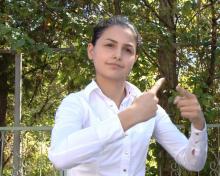 Armenia
Armenia
Languages
Disaster Risk Reduction Project’s Third Phase Officially Launched in Armenia
On October 13, 2014 the “Disaster Risk Reduction in Armenia” project was launched in Yerevan, funded by the European Commission Humanitarian Aid and Civil Protection – ECHO under the DIPECHO programme and implemented by the Armenian Red Cross Society, OXFAM Armenia and Save the Children. The project closely collaborates with the Republic of Armenia Ministries of Emergency Situations, Education and Science, Labor and Social Affairs, Territorial Administration, and the Disaster Risk Reduction National Platform.
The combined efforts of partners involved in the implementation of the action further strengthens the network of experiences, thus becoming a strong asset in assisting Armenia in its efforts to more effectively address disaster management, including preparedness and risk reduction. The regional character of the project – as it is being implemented in South Caucasus – extends the scope of this action to other stakeholders in the region – both Governments and local communities.
Save the Children will be implementing the project - Inclusive Disaster Risk Reduction II (IDRR II) - from May 2014 till July 2015 in Armenia and Georgia, building upon the success of the previous IDRR project implemented in 2012-2013.
As Armenia Country Director Arsen Stepanyan mentioned in his opening remarks, “Children with special needs are a particularly vulnerable group during disasters, yet they and their teachers and caregivers are often excluded from DRR activities and programs.”
With this in view, within the framework of the project, Save the Children works to:
- reflect the needs and rights of the most vulnerable children (including children with special needs) in disaster risk reduction policy;
- build the capacity of children, schools and kindergartens in hazard prone areas to better prepare for, mitigate, and respond to disasters; and
- tackle issues related to disaster risk reduction in the context of the national educational system.
In Armenia, the action targets children with and without disabilities in 20 inclusive schools, 21 kindergartens and 21 special schools and care institutions in Yerevan and Lori, Shirak, Gegharkunik and Aragatsotn marzes. In overall, 18,500 children with and without disabilities and 3,500 teachers/caregivers will directly benefit from the project.

“I had no idea about the right behaviour during earthquakes before. Recently at school we got trained on the right behaviour during emergencies. I am very enthusiastic about it, and now I know that if something happens, I and my friends will have a chance to survive.”
Irina, 14-year-old girl at Yerevan school for children with hearing impairments involved in IDRR